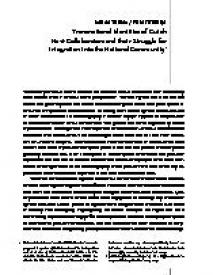Transnational Identities of Dutch Nazi-Collaborators and their Struggle for Integration into the National Community
Transnational Identities of Dutch Nazi-Collaborators and their Struggle for Integration into the National Community
This article aims to shed light on how Nazi collaborators’ transnational encounters and exchanges generated attitudes and outlooks that are different and more diverse than those that one would be able to find when focusing solely on the issue of reintegration from the perspective of the nation-state framework. Military service in the German forces produced significant reconfigurations in the sense of identity and belonging of these non-German Nazis.
Highlighting the Dutch example, we argue that such far-reaching experiences strongly affected the position to which these people aspired in the restored post-war nation-state. We will demonstrate their ambition to adapt their own outlook in some respects to the guiding principles of their liberal-democratic surroundings, and indicate the limitations as well as the opportunities that both state and society provided in the process.
Geachte bezoeker,
De informatie die u nu opvraagt, kan door psychotraumanet niet aan u worden getoond. Dit kan verschillende redenen hebben,
waarvan (bescherming van het) auteursrecht de meeste voorkomende is. Wanneer het mogelijk is om u door te verwijzen naar de bron
van deze informatie, dan ziet u hier onder een link naar die plek.
Als er geen link staat, kunt u contact opnemen met de bibliotheek,
die u verder op weg kan helpen.
Met vriendelijke groet,
Het psychotraumanet-team.
In: Journal of Modern European History, ISSN 1611-8944 | 16 | 2 | 247-268
https://doi.org/10.17104/1611-8944-2018-2-247


